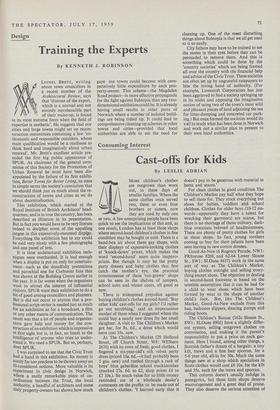Design
Training the Experts
By KENNETH J. ROBINSON
O LIONEL BRETT, writing
about town councillors in a recent number of the Architectural Review, says
iltd that 'distrust of the expert,
which is a normal and not entirely reprehensible part of their make-up, is found in its most extreme form when the field of expertise is aesthetic'. He suggests that our cities and large towns might set up recon- struction committees containing a few 'en- thusiastic and responsible outsiders, whose main qualification would be a readiness to think hard and imaginatively about urban renewal'. Mr. Brett's excellent article pre- ceded the first big public appearance of SPUR. As chairman of the general com- mittee of this Society for the Promotion of Urban Renewal he must have been dis- appointed by the failure of its first exhibi- tion, Better Towns for Better Living, to state in simple terms the society's conviction that we should think just as much about the re- construction of towns and cities as we do about decentralisation.
This exhibition, which started at the Royal Institute of British Architects' head- quarters, and is to tour the country, has been described as illiterate in its presentation. But in fact you would have to be very literate indeed to decipher some of the appalling jargon in this expensively-mounted display. Everything the exhibition has to say could be said very nicely with a few photographs and one panel of text.
It is time architectural exhibition tech- niques were overhauled. It is bad enough when a display is put on only for entertain- ment—such as the dreadfully pretentious and parochial one for Corbusier fans that was shown at the Building Centre earlier in the year. It is far worse when the organisers want to attract the interest of influential visitors. SPUR want their exhibition to do a bit of good among councillors and planners. But it did not occur to anyone that a pro- fessional script-writer is needed just as much for an exhibition as for a broadcast, a film or any other means of communication. The result was that a lot of people and organisa- tions gave help and money for the con- struction of an exhibition which is impressive at first sight but is, in fact, an insult to the Intelligence of anyone who tries to under- stand it. We need a SPUR. But so, perhaps, does SPUR.
I was surprised to see that the Civic Trust had a hand in this exhibition. Its money is surely far too precious to be thrown away on 111-considered notions. More valuable is its experiment in civic design in Norwich, where a really remarkable piece of co- ordination between the Trust, the local authority, a handful of architects and some sixty property-owners has shown how much
gaye our towns could become with com- paratively little expenditure by each pro- perty-owner. This scheme—the Magdalen Road project—is more effective propaganda for the fight against Subtopia than any two- dimensional exhibition could be. It is already having small results in other parts of Norwich where a number of isolated build- ings are being tidied up. It could lead to comprehensive cleaning-up schemes in other towns and cities—provided that local authorities are able to see the need for cleaning up. One of the most disturbing things about Subtopia is that we all get used to it so easily.
City fathers may have to be trained to see the motes in their eyes before they can be persuaded to remove them. And this is something which could be done by the 'amenity societies' which are being formed all over the country with the financial help and advice of the Civic Trust. These societies are often set up by ungrateful ratepayers to bite the loving hand of authority. (For example, Lowestoft Corporation has just been aggrieved to find a society springing up in its midst and opposing the imaginative notion of using two of the town's most wild and pleasant pieces of land adjoining the sea for litter-dumping and concreted car park- ing.) But once formed the societies would do IA ell to study what has been done in Norwich and work out a similar plan to present to their own local authorities.






































 Previous page
Previous page